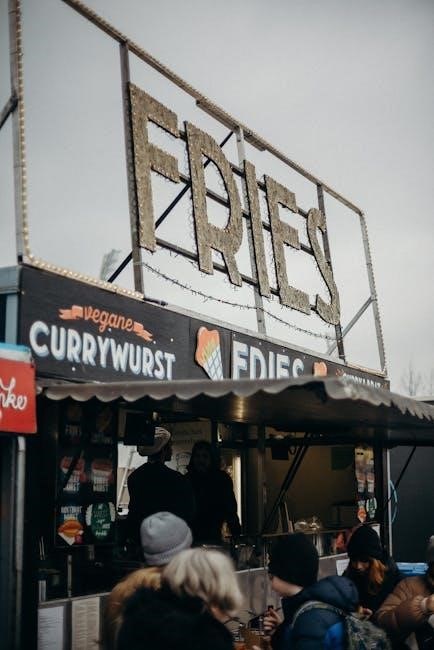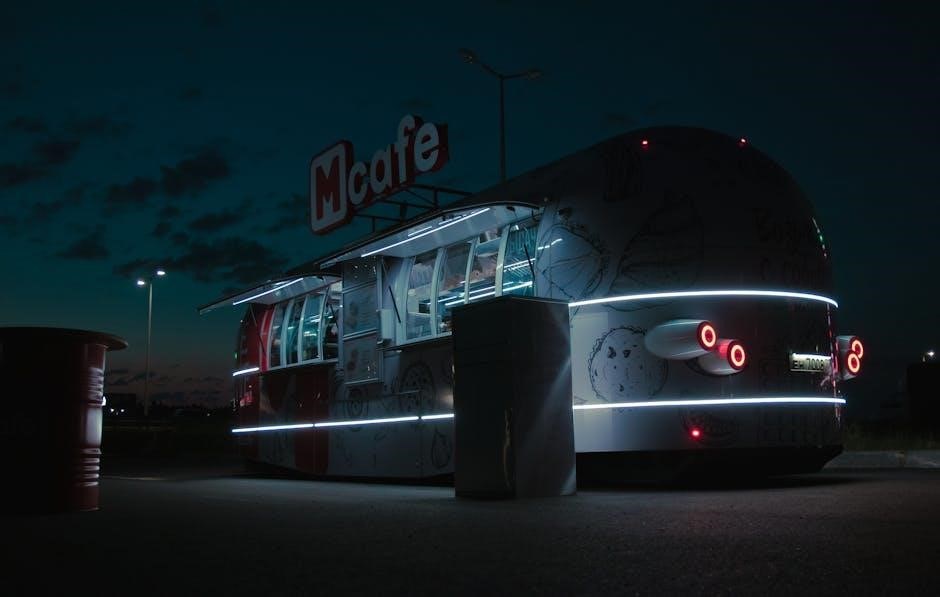Executive Summary
An executive summary for a food truck business plan outlines the venture’s purpose, target market, unique offerings, and strategies for success in the mobile culinary industry.
Overview of the Food Truck Concept
A food truck business revolves around offering diverse, high-quality cuisine from a mobile platform, targeting various demographics and locations. The concept combines flexibility, affordability, and convenience, allowing entrepreneurs to serve a wide range of customers. By focusing on unique menu offerings, such as specialty dishes or regional flavors, food trucks create a distinct brand identity. The mobile nature of the business enables operation at events, busy streets, or popular landmarks, making it adaptable to changing market demands. This concept emphasizes creativity, quality, and customer satisfaction, ensuring a memorable dining experience on the go.
Market Analysis
The market analysis identifies target demographics, evaluates competitors, and assesses current trends in the food truck industry to inform strategic business decisions effectively.
Target Demographics and Competition
The primary target demographics for the food truck include young professionals, students, and tourists seeking affordable, diverse, and high-quality meals. The competition in the mobile food industry is intense, with numerous trucks offering similar cuisines. To stand out, the business will focus on unique menu offerings, superior customer service, and strategic locations. By analyzing competitors’ strengths and weaknesses, the truck can identify niche opportunities, such as catering to specific dietary preferences or operating in underserved areas. This approach ensures a strong market presence and customer loyalty.

Operational Plan
The food truck will operate in high-traffic areas, with a fully equipped kitchen, sourcing fresh ingredients and adhering to health regulations. Daily operations will focus on efficient service.
Menu Offerings and Logistics
The food truck will offer a diverse menu featuring high-quality, locally sourced ingredients. Options include signature dishes, seasonal specials, and customizable meals to cater to various tastes. Logistics involve daily food preparation, supply chain management, and waste reduction strategies. The kitchen will be equipped with essential appliances to ensure efficient food production. Inventory management will focus on minimizing costs while maintaining freshness. Scheduling will optimize service during peak hours, ensuring timely delivery and a seamless customer experience. The menu will be designed to align with market trends and customer preferences, while logistics will ensure smooth operations and consistency in food quality.
Financial Projections
The financial projections outline projected revenue, expenses, and profitability over a 3-5 year period. Detailed forecasts will ensure sustainable growth and informed decision-making for the food truck business.
Revenue and Expense Projections
Revenue projections include income from food sales, catering, and events. Average daily revenue is estimated at $1,500, with annual sales projected to reach $450,000. Expenses include food costs, fuel, labor, and permits. Food costs are expected to be 30% of revenue, while labor costs will account for 25%. Annual expenses are projected at $300,000, yielding a net profit of $150,000. Profit margins are expected to improve as the business scales. Detailed financial models will be regularly updated to reflect actual performance and ensure profitability.

Marketing and Sales Strategies
Effective branding and social media marketing will attract customers. Promotions, discounts, and limited-time offers will drive sales. Building customer loyalty through quality service and engagement is key.
Branding and Customer Acquisition
A strong brand identity is essential for standing out in the competitive food truck industry. This includes a unique logo, catchy name, and consistent visual style that reflects the brand’s personality and cuisine. Social media platforms like Instagram and Facebook will be leveraged to showcase high-quality images of menu items and interact with customers. Influencer partnerships and local events will also help build visibility and attract a loyal customer base. Additionally, offering limited-time promotions and discounts will encourage repeat visits and word-of-mouth referrals.
Customer acquisition strategies will focus on creating engaging content, such as behind-the-scenes stories and customer testimonials, to build trust and loyalty. Email marketing campaigns will keep customers informed about new menu items, special offers, and upcoming locations. Loyalty programs, such as rewards cards or exclusive discounts for frequent customers, will further enhance customer retention and drive long-term growth.

Management and Organization
The management team includes the founder/owner, head chef, and marketing specialist. Each role is clearly defined to ensure efficient operations, with the founder overseeing strategy and finance;
Key Team Members and Roles
The food truck business will be led by a dedicated team with expertise in culinary arts, marketing, and operations. The founder/owner will oversee overall strategy, finances, and customer relations. The head chef will manage menu development, food preparation, and quality control. A marketing specialist will handle branding, social media, and promotional activities. Additional staff, including part-time cooks and customer service representatives, will support daily operations during peak hours. Each team member’s role is clearly defined to ensure efficient workflow and customer satisfaction, driving the business toward long-term success and scalability.

Menu and Pricing
The menu features diverse, high-quality dishes with competitive pricing to attract a broad customer base. Prices range from $8 to $12 per meal, ensuring affordability and value.
Product Offerings and Pricing Strategy
The food truck will offer a diverse menu featuring high-quality, flavorful dishes catering to various tastes and dietary preferences. Signature items will include gourmet burgers, fusion tacos, and specialty sandwiches. Pricing will range from $8 to $12 per meal, ensuring affordability while maintaining profitability. Beverages and desserts will be available as add-ons, priced between $3 to $5. The pricing strategy focuses on value-for-money, with portion sizes and ingredient quality justifying the cost. Seasonal specials and combo meals will be introduced to attract repeat customers and boost average order value. This approach ensures broad appeal and sustained customer satisfaction.
- Signature dishes: $10–$12
- Classic options: $8–$9
- Add-ons: $3–$5
- Combo meals: $12–$14

Funding Requirements
The food truck business requires an initial investment of $100,000, covering the truck, kitchen equipment, permits, and working capital. Funding will be sought through loans and investors.
Investment Needs and Potential Investors
The food truck business requires an initial investment of $100,000 to cover the purchase of the truck, kitchen equipment, permits, and initial working capital. Potential investors include venture capitalists, angel investors, and local food enthusiasts. The business will appeal to investors seeking high returns in the growing mobile food industry. A detailed financial plan and ROI projections will be presented to attract funding. Strategic partnerships with food suppliers and local event organizers will also be pursued to enhance viability and attract investor confidence in the business model.

Legal and Regulatory Requirements
Obtaining necessary licenses, permits, and complying with health codes are critical. Food safety certifications and local regulations must be adhered to ensure smooth operations and legal compliance.
Licenses, Permits, and Compliance
Starting a food truck requires obtaining essential licenses and permits, including a food service permit, business license, and fire department permit. Health inspections and food safety certifications are mandatory. Compliance with local health codes, zoning laws, and parking regulations is critical. Additionally, ensure proper waste disposal and food handling practices; Failure to meet these requirements can result in fines or operational shutdowns. Researching and securing all necessary documentation beforehand ensures a smooth launch and ongoing compliance with legal standards. Regular renewals and updates to permits are also necessary to maintain legality and avoid penalties.
A well-crafted food truck business plan guides your vision, outlines strategies, and sets achievable goals. Stay committed to quality, innovation, and customer satisfaction for long-term success.
Final Thoughts and Future Goals
Launching a food truck business requires careful planning, adaptability, and a passion for quality cuisine. By focusing on unique menu offerings, strategic locations, and exceptional customer service, the business can establish a strong reputation. Future goals include expanding the menu, exploring new markets, and potentially scaling the concept into a fleet of trucks. Continuous innovation and a commitment to sustainability will ensure long-term success. This business plan serves as a roadmap to achieve these objectives and create a thriving mobile culinary brand.
